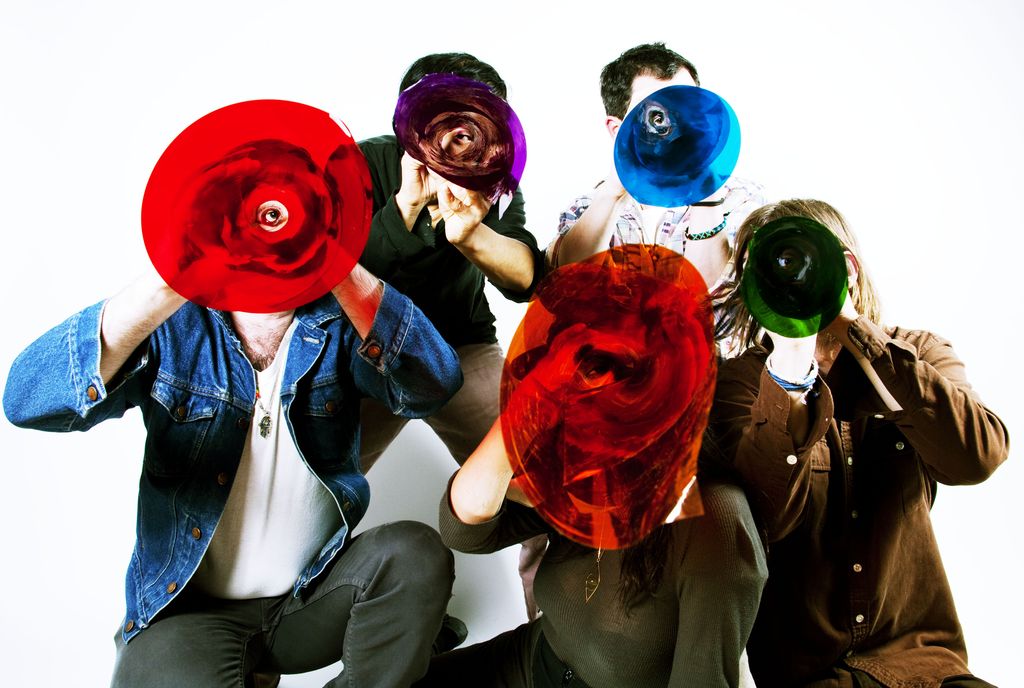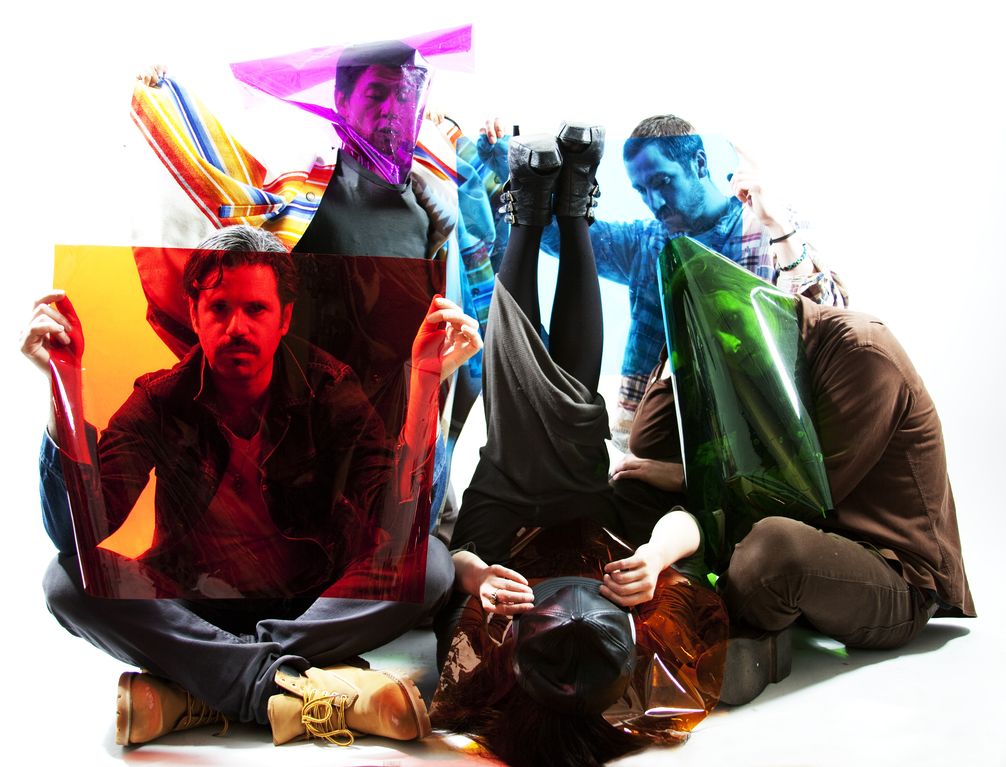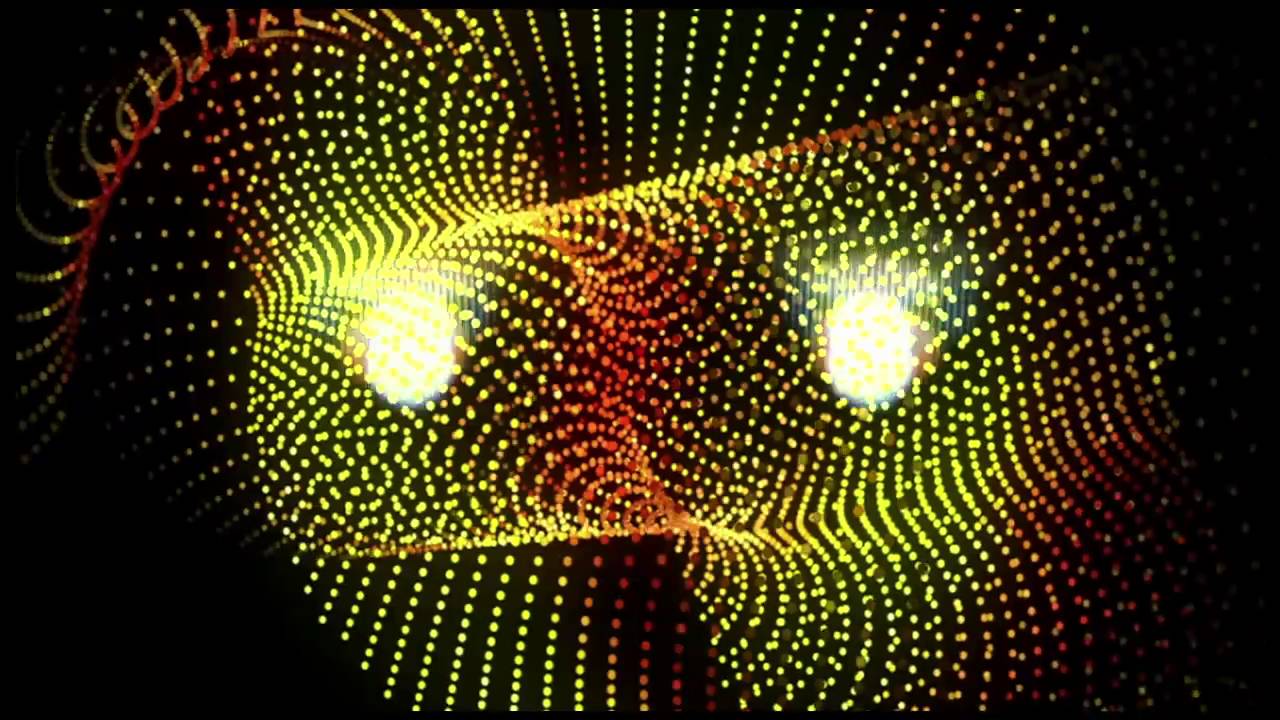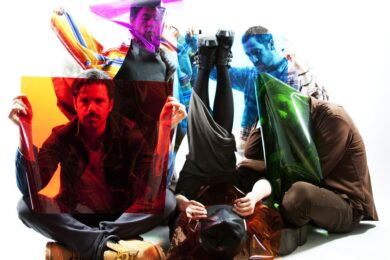Over the course of a decade and several albums of cut ‘n’ paste digital psychedelia, Brooklyn’s Gang Gang Dance have established themselves as an entity in a perpetual state of transition. Rather than ever fully encapsulating the group’s complete vision, each record functions more as a snapshot of a particular time and a particular place, one single stage in an ongoing evolutionary process. But unusually for music that takes on such a different form in the live arena – where their performances are given time and space to sprawl, drifting seamlessly from freeform improv into short sharp shocks of pure pop – each album has been a remarkably complete listen in its own right.
After a series of largely improvised early recordings, 2005’s spectacular God’s Money marked a turning point, the moment where their collage-like assembly process (bolting together tracks from samples and scrappy recordings of their own performances) was hijacked to create an album of surprising accessibility. The showers of noise and asymmetric rhythms were still present and correct, but instead of drifting they danced rings around one another. After the dancehall shuffle of the Rawwar EP, 2008’s Saint Dymphna was a worthy follow-up, further honing their pop edge and emphasising a shared directness with the UK’s urban sounds of grime and dubstep. While retaining the wildly anarchic, order-from-chaos feel that defined their earlier music, it began to unearth the hypnotic dancefloor sensibility that’s fully possessed their new album Eye Contact.
The band suffered a major setback in early 2009, when almost all of their equipment – including a library’s worth of new recordings and self-recorded samples – was destroyed in a fire on the opening night of their European tour. But despite the loss of thousands of pounds’ worth of gear and a host of unique and customized equipment, Eye Contact brims with a bright, pop-friendly edge that contrasts sharply with the darkened, introspective feel of previous recordings. Where God’s Money would have droned, it shimmers. Opener ‘Glass Jar’ is among the finest things they’ve yet committed to tape, an eleven-minute statement of intent that gradually coalesces from formless clouds of new-age synth into a driving, sun-soaked tropical jam. In keeping with their earliest recordings, though, it evokes the same process of order assembling itself from chaos, emphasising the fractal nature of their music – the closer you look, the more it reveals. The rest of the record continues in a similar vein, moving from the build-and-release tension of ‘Adult Goth’ to the loping nightclub groove of ‘MindKilla’, which drives with the same syncopated bounce as kwaito or UK funky.
In the run up to Eye Contact‘s release, The Quietus met up with the band, consisting of Lizzi Bougatsos (vocals, percussion), Brian DeGraw (keyboard, electronics, percussion), Jesse Lee (percussion) and Josh Diamond (guitar), in a London pub to chat about the new record, the relationship between their musical and visual selves and the hazards of touring with expensive and irreplaceable gear.
So how did the new album come about? It’s been a while since Saint Dymphna – when did ideas for Eye Contact first start coming together, and when did you finish it?
Liz Bougatsos: It started in the desert in 2009, and then it ended at Woodstock. I think what happened was that we got some really good opportunities in between the desert and recording in New York. We got asked to play on a Russian cruise ship with the Boredoms, which was really special. And we got asked to lead the Boadrum for the Boredoms. It felt like we kept getting opportunities we couldn’t pass up.
Jesse Lee: When I joined the band in 2008 we immediately, [on] the very first day, wrote what would become ‘Glass Jar’, ‘Adult Goth’ and ‘Thru And Thru’. We wrote some more, and then toured on Saint Dymphna. We thought we were ready to record, so we went out into the desert in California to try to do it on our own with nobody backing us, just with money from the shows and stuff. It was great, and we learnt a lot, but we realised the record wasn’t really ready. So it’s been three years of planning, and all these songs have been changing the whole time, even up to the point where we actually recorded them. Now that all’s said and done, all that time was needed, it all worked out, so that the songs could be what they are.
You’ve definitely been playing ‘Glass Jar’ for a few years now. Is that something that happens with a lot of your songs then, that they mutate and evolve through playing live?
Brian DeGraw: Yeah. There’s usually a whole set of new songs by the time a new record comes out which we’re supposed to be playing songs from. So we play barely any of the songs [from the new record].
Have you got to that point now, where you have a whole set of songs that are newer than those on Eye Contact?
JL: This is a weird part, where we actually only really know the songs that are on the record. We haven’t really had enough time to write more. We have stuff on the burner, but as far as playing live goes, what we know is all stuff that’s on the record. At least for a couple of months, there’s going to be a sweet spot where people who like the record and come to see us live will actually get to see and hear the songs that they know. Which will be interesting.
That always seems to be the case with Animal Collective as well, their live performances tend to run several leagues ahead of their recorded output.
JL: They’re on some whole other thing – they’re usually about three albums ahead! I would see them and go ‘What’s that song, it’s amazing?’, then two albums later it’s on there in some reworked way.
LB: We’re kind of slow. Some of our friends call it the ‘Gang Gang Shuffle’.
JL: We have our own pace. It can’t be forced, even if you try, it doesn’t work like that.
So did it come to a point where you felt these songs were ready to record?
JL: For sure. It definitely got to a point where we needed to record them or they were going to eat us alive, or something.
BD: Or at least disappear.
LB: We like to throw out a lot of stuff so I was particularly afraid that a few songs we wrote were going to go away. But actually the consensus is that the ones I thought we were going to throw out are probably still going to happen too.
So was there anything in particular you wanted to achieve with this album, or approach differently to what you’ve done before?
BD: Not really, we never really do that. It always takes shape as it goes along. We never have a clear idea of what it’s going to be.
JL: I was happily surprised at how well it all went together. Part of it was that Brian made these beautiful interludes – one of them has Liz’s cousin singing in Greek – that bridge the songs together. But even aside from that I was happy that they all flowed together and made sense. It’s the story of what we’ve gone through, the last three or four years of our journey together. It makes so much sense to me and flows together, but at the time we were recording it didn’t necessarily seem like any of the songs had anything to do with each other at all. I was definitely wondering whether this was going to be an album where every song sounded like a different thing. And maybe it is, in a way, but I think there’s something flowing through them all.
BD: I think it has the best flow of any of our records actually, surprisingly. When I listen to it, I feel that.
LB: It’s interesting that it has the best flow. Normally we’re very conscious of making the flow of the album. Usually the music never stops on our albums, but on this record for some reason we actually have it stop in places.
JL: We’ve been getting into that lately, stopping between songs.
LB: We’ve been doing that live too.
You started off by making a lot of improvised music. Is there still much of that element to your live show?
BD: Yeah. Not as much as in the very beginning, but there are definitely still designated areas where that happens, where we don’t know what’s going on.
JL: After touring for a straight year for Saint Dymphna, it became a saving grace to be able to have improv, because otherwise you’re playing the same thing every night. We try to change the songs a little bit each time we play, but they’re still our jams, they have set parts and stuff. It becomes really important to be able to have that, to make up something new on the spot, it keeps us interested.
JD: I think we try to play songs with an improvised feeling even if they’re not. There might be specific things we know what to do, but they don’t always sound the same.
There was a show I saw you guys play in London…
JD: Oh boy… [rolls eyes and laughs]
When your equipment just died about 25 minutes in.
JL: Brian’s keyboard died.
BD: It exploded before the show, and we tried to fix it. Then when it broke during the show we tried to improvise, and then tried again to play another song with all the broken stuff, but it was just a weird version. My whole keyboard was transposed wrongly, all the keys were shifted.
JL: That keyboard, an old Yamaha, was in Gang Gang for a long time, but the pitch broke to the point where it was totally different. I just remember Brian’s face [when it happened], him slamming on the keyboard.
It’s typical for it to happen during the middle of a show.
JD: I remember one of our early shows was at this loft in Harlem and the show was just going wrong, so Brian’s improv was just to take his keyboard and smash it into a million pieces.
BD: I thought that was a good show [laughs].
JL: Whenever we talk about that London show, Brian’s like [pulls long face]. But I actually liked it in a way, we’d actually been playing enough that it was cool for something fucking weird to happen. Alexis [Taylor, Hot Chip frontman] was there and he was really sweet – he actually gave us his keyboard to play for that, and then he came up and jammed with us. Musically, maybe it wasn’t the best, but I thought it was really rad that during this show everything just melted down in front of everyone, so we just had to be like ‘We’ll be back in five minutes, we’ve just got some technical difficulties!’
At first it looked like it was a planned interlude, then after a few minutes everyone’s face started to look a little bit more panicky. But I thought the improvised rest of the show sounded really good actually.
BD: We should do it more [laughs]. You’ve got to be ready for anything to happen.
JL: But we have a more specific situation because a lot of bands just have guitar, bass and drums, and if something should happen and their instrument fucks up someone can lend them one and they can still play. But we had our tour [in 2008] where all our equipment burned down, and it’s all just very specific: samples on soundcards, and Josh has a MIDI guitar set up that no-one usually uses because it’s not really meant for the road. So it was hard when that happened, when our shit burned down people would think ‘Can’t you just rent some more gear and keep going?’ But it was actually really specific to us.
Losing all your gear in the fire must have been a fairly major setback, presumably you lost a lot of stuff?
JL: At the time it definitely was.
LB [at Josh]: I never really realised it until just now, but really your set-up is just not made for the road. It’s a total studio set-up!
JL: But that’s why it’s special.
LB: It’s so fragile, and we’ve been carrying it around for about ten years. And when our stuff got burned it was just a nightmare. It took him almost two years to recover all the sounds – right, Josh?
JD: I had to build the guitar again basically, because it took out my pick-ups from the guitar. When something breaks and it’s about two thousand dollars to replace, it’s difficult.
LB: It was just really multi-faceted.
So what exactly happened?
JL: We were on a European tour and it was the first show at the Paradiso in Amsterdam, in the smaller of the rooms there. We were leaving the next morning, so we finished our show, then packed up our stuff and I asked the guy: ‘We’re coming back at about eight in the morning to get our gear, can we just leave it here on the stage? It’s all packed up already.’ But he said they didn’t like to leave stuff on the stage overnight. I was pleading with him, and he said they had this room where we could store stuff, a tiny little anteroom, so small in fact that we had to stack everything up to the ceiling. Just the week before they had put in new smoke detectors, and the smoke detector was wired wrong in that little room, and it caught fire. I don’t know if you’ve ever been to the Paradiso – it’s a huge venue, but it was just this tiny room where we had to stack our gear that burned from the ceiling down, because of the smoke detector.
That’s quite horribly ironic.
JL: I know. So we got this call in the morning: ‘There’s been a fire, I think some of your stuff might have gotten burned.’ We ran over there, and it was like a horror movie for a band. Our t-shirts, all our merch and shit was strewn through the hallways, because the fire department went in there and sprayed everything with water. And all our stuff was in the parking lot still smouldering. We walked in and saw burnt Gang Gang shirts all over the stairs.
BD: When they called us, the way they said it made it sound like it was only one or two things that got burned. And then we show up and it’s literally all still smoking.
JL: There were a few things that were salvageable, but a lot of sounds and samples were completely lost.
BD: It was just after we’d done the desert recordings, and we’d written some new stuff, and there were samples I had which weren’t backed up yet. Those songs are out there somewhere…
The new record is called Eye Contact, but it’s the first album for a while you don’t have eyes on the front cover of. What was the idea behind the title of the album, and the artwork that accompanies it?
BD: Well there are eyes – they’re just not human eyes. Not Nate’s eyes [the artwork for each of their previous albums features the eyes of bandmate Nathan Maddox, who passed away in 2002]. But the title just refers to the sound and the mood of the record. It’s more direct, in contrast to the past where to me [our music] always felt like closed eyes, like escaping into yourself or into ourselves. But with this one it didn’t feel like that, it was more like ‘here we are, here you are’.
JL: And the way we wrote these songs, we hardly even talked, we were just playing. Communicating that way, musically and through eye contact.
JD: It’s still a fantasy, but it’s just more an eyes open fantasy.
It definitely seems less inward looking and brighter.
BD: There’s definitely a strength to it, sonically, that reminds me more of being wide-eyed rather than hidden away.!

Along with that, it feels a lot more accessible and perhaps a little more song-based than some of your other records. Was that conscious, or again something that just fell into place?
BD: We don’t ever do things consciously.
JL: There’s never a point where we think ‘we should make a song which sounds like this’. We just get together and start playing, and we won’t talk at all about music between those times. But it’s traveling together, just playing and feeling things out, sticking with the things that are really working and making them better.
And you often have other releases between albums that tend to be a lot more cut ‘n’ paste, like Retina Riddim or last year’s Kamakura EP. Is the process of working on those quite different?
BD: This record was the least like that, which had a lot to do with the amount of time we had to record – more than usual – and the environment. It was a lot less chaotic. In the past when we recorded, I think a lot of that aspect came out: the chaos of the environment and how little time we had. We’d improvise bits of the record, then only have five more days to finish, so we’d just start cutting and pasting.
Using the bits that worked really well to make the finished record.
BD: Yeah. And I love that process too but with more time it felt more spacious, letting it breathe a little, allowing us to think about it a little more.
JL: It’s good. We needed every bit of time we had.
BD: And we had a whole period of time to mix after tracking, so it breathes a little more.
Having a lot more time to record this album must have felt quite different psychologically, you must have felt a lot less under pressure.
BD: Totally. And the songs on the record were way more prepared than usual. Usually we’d have maybe two songs when we went into the studio, and the rest would have been improv. This time we’d been playing a lot of the songs for one or two years beforehand.
Which might, I suppose, explain why some of your songs on Eye Contact sound so much more like ‘songs’ rather than cut ‘n’ paste pieces.
BD: Definitely.
Your music’s always been strongly focused on rhythm, but recently it seems to have become closer to dance music than it was before, a lot of the songs on here are far more physically direct. ‘Mindkilla’ reminds me a bit of UK funky, it’s got that galloping beat and dancehall-ish rhythm. Has that sort of music inspired the music you’ve been writing?
BD: I think in the past few years I’ve listened to more dance music than any other type of music.
JL: Brian’s also one of my favourite DJs. He’s been doing it a long time, and he’s been taking it to crazy levels. I can’t help thinking that’s a part of it.
BD: For me it’s a huge influence on making music. I’m so much more into transitions than songs now, thanks to DJing.
JL: When we’re doing live shows and there’s a DJ playing before we start – hopefully a good one! – we’ll often mix into their set. Those are my favourite openings to shows, where it’s seamless and people don’t even realise the show’s starting.
BD: Playing live is interesting because we can sort of mix our own music, knowing the BPMs of certain songs, creating transitions.
JD: We’re really into mixing our live show, it’s not always that way, but sometimes the transitions in our show are like DJing our own music. I think that is pretty specific to a DJ sort of perspective.
The other important aspect of the band that often doesn’t seem to be discussed so much is the visual side. You’ve always had quite a strong visual identity – has that developed over the period of time you’ve been in the band?
LB: It’s only gotten stronger.
JL: Brian just had his art show opening the day we left New York. And Lizzi’s always working on shit. All Josh and me know is music, but sometimes we go over and help Liz out with stuff.
Do you think the art feeds into the music, and vice versa?
LB: More and more. I always decided to separate it because I couldn’t really focus when I was combining them, but more and more it’s become like a coil or a snake, it eats its own tail.
I guess they’re two sides of the same coin, really.
BD: Yeah. With 4AD now too, we finally get the chance to explore, we’re going to have a budget to do stage presentations, which is super exciting. We haven’t worked it out yet, but the gears are turning.
Live visuals?
JD: Yeah. It’s something we’ve always wanted to do, because our music feels very visual, and I think all of us associate it with something visual. And live I think it would make our live show so much better.
It surprised me in the past that you didn’t have live visuals, because I always expected you to be one of the bands who probably would do.
BD: We always wanted to, but it’s been really difficult with time and money. So being able to do it now is really exciting.
So what’s the plan for now? Touring the record?
BD: Yeah. And just trying to find pockets of time to write new music, we’re dying to write something new.
LB: We’re going to go to Miami, that’s the next stop. We’re going to go there and write the next record as soon as we can.
That should give it a nice summery feel, then.
JL: It’s going to be a salsa record [laughs].




